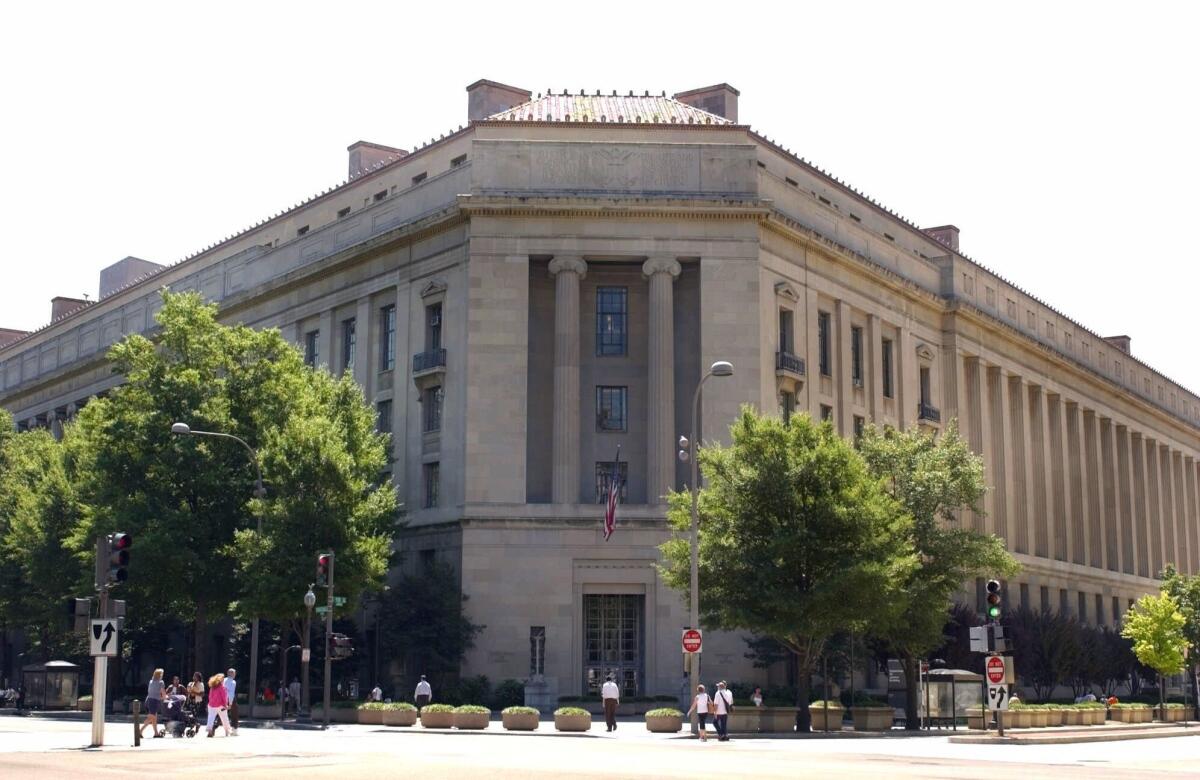Justice Department wants tougher oversight of local broadcasters

- Share via
The practice of competing local television stations sharing resources needs tougher regulations, the Justice Department warned Friday.
In a filing to the Federal Communications Commission, the department said agreements between local television stations to partner on business and editorial operations “often confer influence or control of one broadcast competitor over another.”
It added that that such arrangements can also allow broadcasters to circumvent the FCC’s rules limiting the number of television stations one company can own.
Known in the television industry as joint sales agreements, shared service agreements or local news service agreements, such arrangements have become commonplace, particularly in small and midsize markets. Typically, a strong television station will team up with a smaller station and assume a role in the operations of that station.
PHOTOS: Behind the scenes of movies and TV
For the larger station, having another outlet can give it leverage when it comes to buying programming, while the smaller station can have some of its operational costs reduced.
The FCC is in the process of reviewing how it oversees partnerships between local TV stations in the same market. One possibility is that the FCC will start applying its ownership rules to TV stations that have combined operations.
Such a move would likely ground the practice to a halt. In many markets, FCC rules already limit a company from owning more than one or two stations. If partnerships counted against ownership caps, it could have major ramifications as previous arrangements likely would not be grandfathered.
A scenario being floated is that the FCC would decide whether ownership rules should apply based on the percentage of ad sales that can be attributed to a joint sales agreement. For example, if the figure is more than 15%, than ownership rules would count. A vote on the matter by the FCC is expected next month.
ON LOCATION: Where the cameras roll
Broadcasters argue that such collaborations are necessary for the industry to remain competitive. The savings that come from sharing resources, they claim, leads to a better product on the screen.
Media watchdogs and consumer groups have countered that such combinations actually reduce the level of programming diversity and the number of independent voices. The Justice Department’s filing has given those groups more fuel for their case.
“The Department of Justice recognized that the alphabet soup of arrangements -- the JSAs, SSAs, LNSs, and whatever other clever monikers that broadcasters dream up -- destroy competition when they place two or more stations in a market under common control,” said Lauren Wilson, policy counsel for Free Press, a media watchdog group.
In its comments, the Justice Department expressed concern that these deals between broadcasters could harm competition by “increasing the potential for firms to coordinate over price or other strategic dimensions, and or by reducing incentives of firms to compete with one another.”
PHOTOS: Celebrities by The Times
Broadcasters fear that the Justice Department’s filing could have tremendous influence on the FCC’s decision-making process.
In a statement, the National Assn. of Broadcasters said partnerships between TV stations “allow local TV stations that might otherwise go out of business to increase local news and community service” and warned that the Justice Department’s conclusions “could kill jobs and damage the economics of local broadcasting.”
ALSO:FCC issues new closed-captioning rules
CBS entertainment chief Nina Tassler gets new title and contract
DOJ clears Gannett - Belo deal but demands sale of St. Louis station
Twitter: @JBFlint
More to Read
Sign up for The Envelope
Get exclusive awards season news, in-depth interviews and columnist Glenn Whipp’s must-read analysis straight to your inbox.
You may occasionally receive promotional content from the Los Angeles Times.











